Looking back at slang through the decades
 Students walking into Banting Memorial High School in Alliston, Ont., on Tues., Dec. 12, 2023. (CTV News/Alessandra Carneiro)
Students walking into Banting Memorial High School in Alliston, Ont., on Tues., Dec. 12, 2023. (CTV News/Alessandra Carneiro)
It has been said that knowledge of languages is the doorway to wisdom.
Still, it is hard to feel terribly wise when using our modern-day language, so rife with slang from rizz to skibidi to drip.
While these terms may come and go, experts say the phenomenon behind them, which constantly churns out brand-new bon mots, is as old as language itself.
“I don’t think you can possibly talk about language without slang being a part of it,” said Nicole Rosen, head of the University of Manitoba’s linguistics department.
“As long as there's been language, there's been slang.”
So what’s behind these dialectical developments?
Historical linguistics presents a few clues, Rosen said, showing how the meaning of different words can evolve or even switch completely.
“For example, in the ‘80s, it was gnarly. Gnarly actually is like gnarled wood, right? Or it's a negative thing, but it could mean really good, too” she said.
“These different meanings coexist in language right at the same time and with different people, they mean different things.”
 Nicole Rosen, head of the University of Manitoba's linguistics department, is shown in an undated photo. (University of Manitoba)
Nicole Rosen, head of the University of Manitoba's linguistics department, is shown in an undated photo. (University of Manitoba)
Young people are at the forefront of much change, Rosen said, so it is only natural they commonly lead the way in evolving our language.
Like the way you dress, slang can be a way of showing solidarity with a group or distinguishing yourself from the establishment, be it parents or teachers or the generalized, oh-so-maligned ‘Man.’
Slang can also signal to older generations that a societal change is afoot, Rosen said.
“Older people in general don't like when things are changed, and they don’t like feeling like they're not at the forefront anymore,” she said.
“They might not like the fashions, you might not like the music, you might not like the speech - these are all interrelated in terms of societal changes.”
While we of the non-Gen-Z population may shake our Gen X or Boomer fists when we hear about brat summer, cap, or sus, we too left our semiotic stamp on language.
Here are a few pieces of slang or turns of phrases from generations past, neither gone nor forgotten thanks to Green’s Dictionary of Slang.
1950s
Daddy-o - noun
Though this particularly dated piece of slang gained popularity in the ‘50s, its origins were first recorded in the 1910s,
According to Green’s Dictionary of Slang, daddy-o is a familiar term of address between men. It gained traction with the African American jazz culture of the 1950s and was then adopted by the largely white beatnik set.
Greaser – noun
Before a leather-clad, oil-slicked Danny Zuko gyrated onto stages and screens in the ‘70s, greaser referred to a certain type of motorcycle-riding teen or man, his hair larded with Brylcreem to give it an oily sheen.
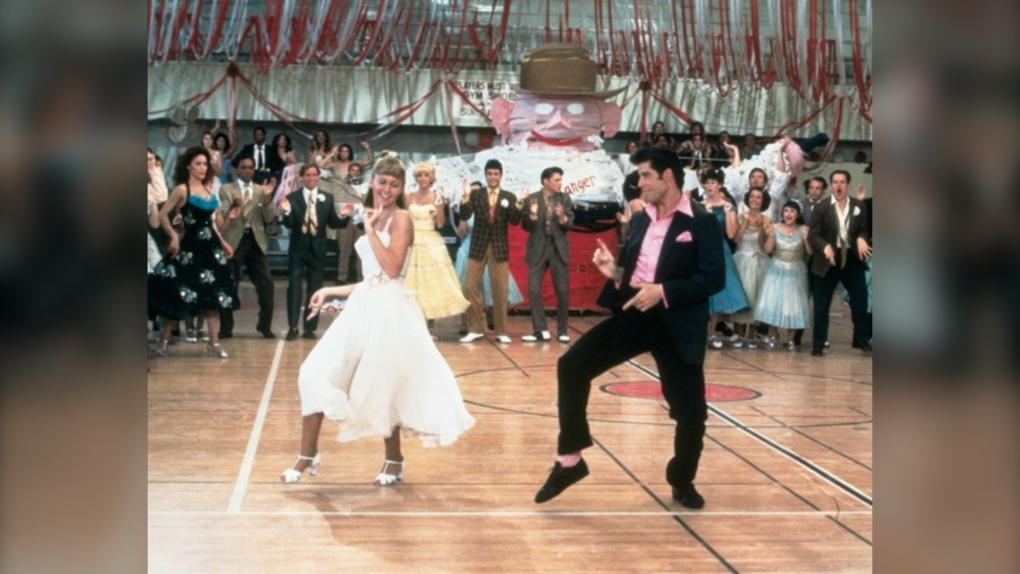 Left to right: Olivia Newton-John (as Sandy Olsson) and John Travolta (as Danny Zuko) in "Grease." (Paramount Pictures)
Left to right: Olivia Newton-John (as Sandy Olsson) and John Travolta (as Danny Zuko) in "Grease." (Paramount Pictures)
1960s
Dig it – slang phrase
Another byproduct of African American jazz musicians, to dig something in the ‘60s meant to like, enjoy or understand it.
Can you dig it?
Outta sight – slang phrase
According to Green’s Dictionary of Slang, this has some serious literary roots dating back to the 1890s and was used four times in Stephen Crane’s novel “Maggie: A Girl of the Streets,” becoming Bowery slang for astonishingly excellent.
For unknown reasons, hippies and teens in the ‘60s started using the term to refer to something as beyond comparison or superior.
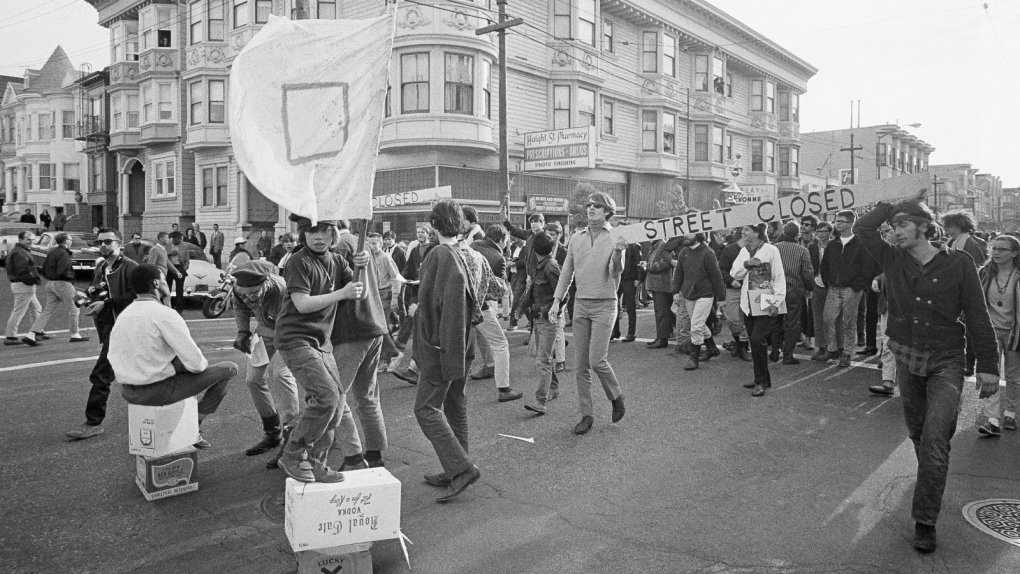 People parade up and down the streets of the Haight-Ashbury district in San Francisco on April 3, 1967. (AP / Robert W. Klein)
People parade up and down the streets of the Haight-Ashbury district in San Francisco on April 3, 1967. (AP / Robert W. Klein)
1970s
Jive turkey – noun
Having nothing to do with Thanksgiving, jive turkey was used in the ‘70s to refer to someone as an insincere, deceitful, or dishonest person. According to Green, it first showed up in the African American lexicon and caught on.
Threads – noun
A slang term for clothes. When used by the disco set, it likely referred to bell bottoms, platforms, and love beads.
1980s
Gag me with a spoon! – slang phrase
We have officially entered the age of the Valley Girl.
This particularly vivid turn-of-phrase was committed to music in Frank Zappa’s 1982 hit “Valley Girl”, where a teenage girl exclaimed “It’s like totally disgusting. I’m like so sure. It’s like barf me out. Gag me with a spoon!”
According to Rosen, ‘80s slang is a distinct product of its time.
“It was a time of fun and excess and things like that,” she said.
“I think it kind of reflects the ‘80s. It was a time of wealth and abundance. I think that every generation sort of has that.”
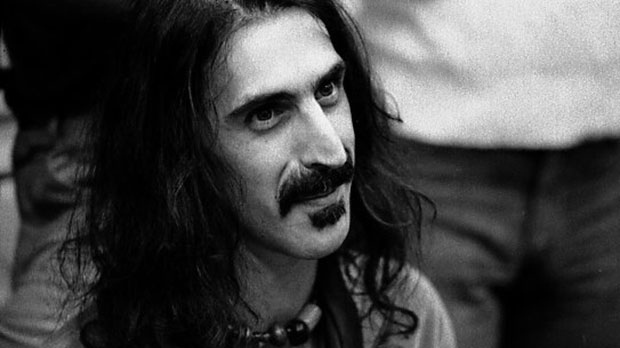 Frank Zappa in Toronto, 1977 (Jean-Luc/ Wikipedia)
Frank Zappa in Toronto, 1977 (Jean-Luc/ Wikipedia)
Gnarly – adjective
Valley Girls weren’t the only demographic to shape the lexicon in the ‘80s. The surfers had their say, too.
According to Green, gnarly was popularized in the film “Fast Times at Ridgemont High” by Spicoli and his surfer gang, and was used to reference something bizarre, frightening, or even amazing.
As Rosen noted, its actual origins reach back to the 1840s to refer to a dry and gnarly log of mountain ash, making its evolution to the California beach bum crowd a particular head-scratcher.
1990s
Booyah – Slang expression
An exclamation of excitement and joy, its roots are a bit unclear. It could come from the name of a kind of strew, a Navy SEALs battle cry, or from the West Coast rap scene in songs like Dr. Dre’s “187”.
It also gained footholds in sports, thanks in large part to ESPN sportscaster Stuart Scott, who used the phrase exuberantly in his broadcasts, even leading to a Saturday Night Live sketch parody.
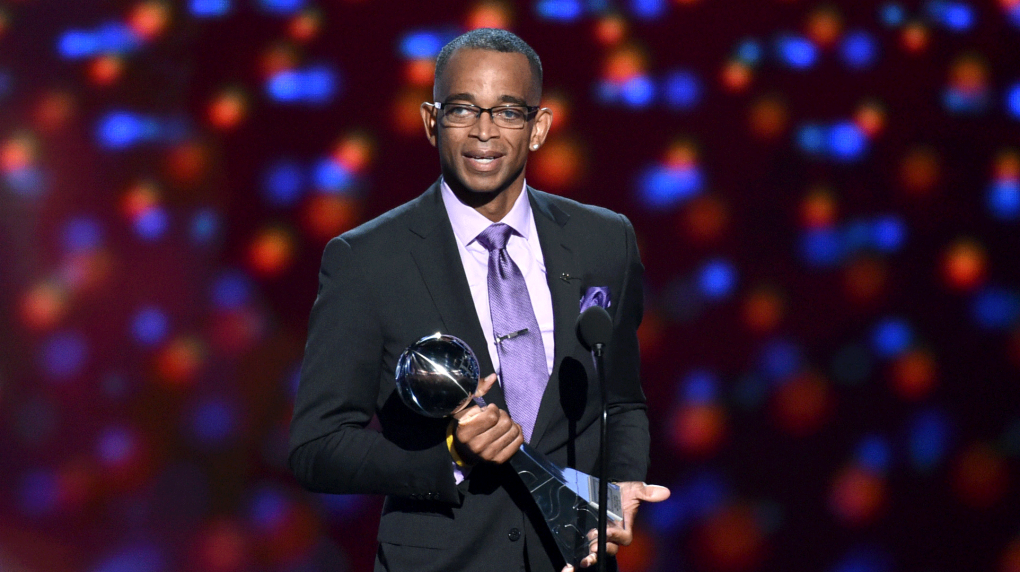 Sportscaster Stuart Scott accepts the Jimmy V award for perseverance, at the ESPY Awards at the Nokia Theatre on Wednesday, July 16, 2014, in Los Angeles. (Photo by John Shearer/Invision/AP)
Sportscaster Stuart Scott accepts the Jimmy V award for perseverance, at the ESPY Awards at the Nokia Theatre on Wednesday, July 16, 2014, in Los Angeles. (Photo by John Shearer/Invision/AP)
Talk to the hand – Slang expression
Often accompanied by the palm of the hand in front of the face of the person on the receiving end of this quintessentially ‘90s quip, it is meant to tell someone to be quiet, shut up, or that they don’t want to hear it.
2000s
Bling Bling - Noun
This repetitive repartee finds its roots in hip hop and rap, and is slang for someone’s showy or ostentatious jewelry.
Chillax - Verb
A hybrid of chill and relax, Green’s Dictionary of Slang finds its earliest roots in 2000.
This is the word to use if your friend’s upset "and you want to get them to chill out and relax,” the dictionary reads.
Simply reading the definition transports you back to Y2K.
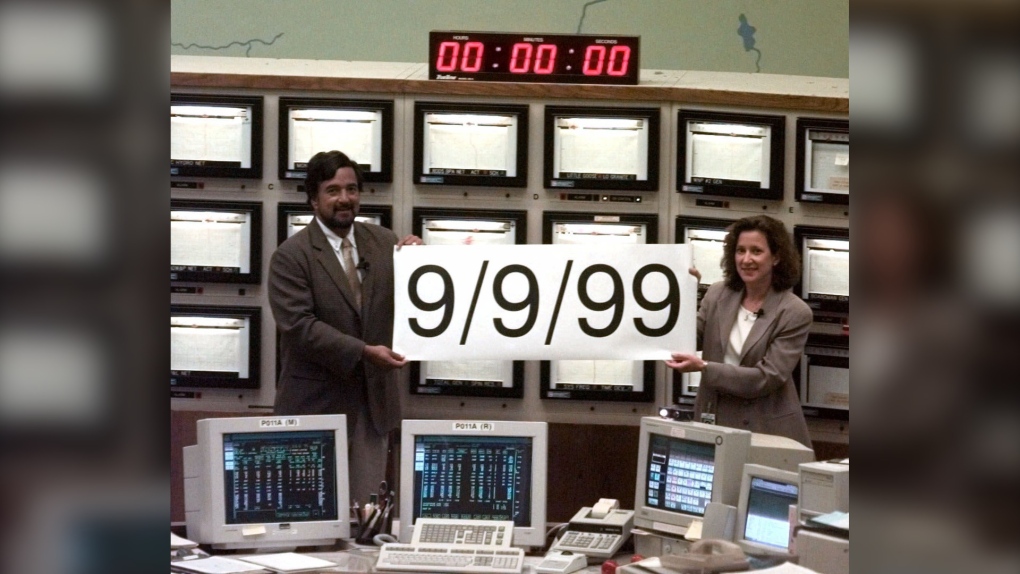 U.S. Department of Energy Secretary Bill Richardson holds up a 9/9/99 sign with Bonneville Power Administration administrator Judi Johansen as the clocks hit midnight during a Y2K drill. (AP Photo/Don Ryan)
U.S. Department of Energy Secretary Bill Richardson holds up a 9/9/99 sign with Bonneville Power Administration administrator Judi Johansen as the clocks hit midnight during a Y2K drill. (AP Photo/Don Ryan)
2010s
Bae – Noun
A boyfriend, girlfriend, or romantic or sexual partner. Bae is said to be an acronym for ‘before anyone else.’
Its origins are a bit unclear, but Green tracks it back to a popular meme that trended in 2014.
Catfish – Verb
The term comes from a documentary and ensuing television show of the same name by Henry Joost and Ariel Shulman, following a young man’s quest to unmask the true identity of the person he’s been corresponding with online.
Today, it means a promise or claim that turns out to be false.
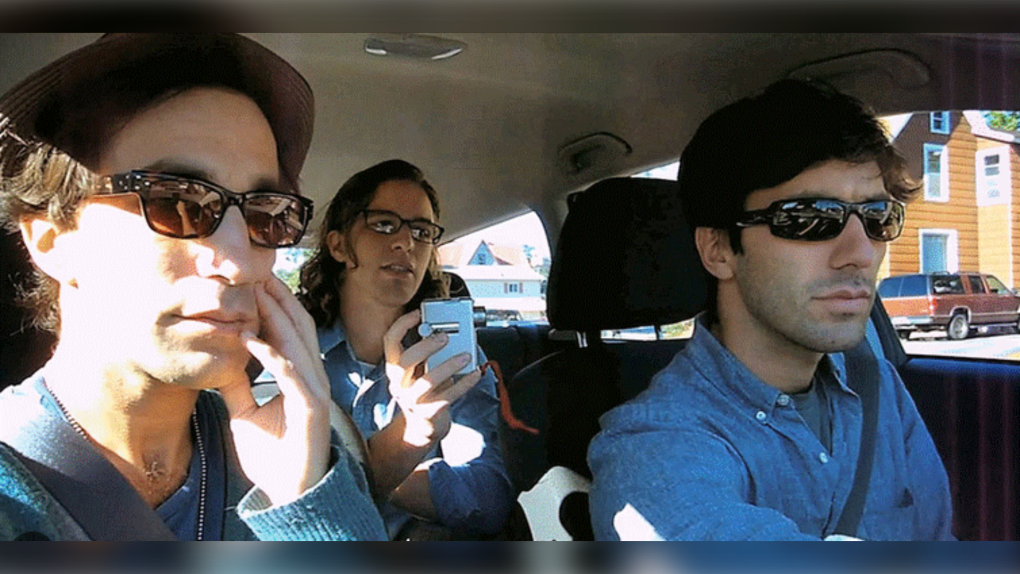 A still from the 2010 documentary "Catfish". (Universal Pictures)
A still from the 2010 documentary "Catfish". (Universal Pictures)
2020s
Rizz - Adjective
Rizz is believed to come from the middle of the word charisma, and can be used as a verb, as in to "rizz up," or chat someone up.
Bussin' - Adjective
A catch-all word to define anything that's really good - bussin' is not exactly new.
It was added to Urban Dictionary back in 2017.
A more formal explainer can be found through Merriam-Webster, which defines bussin' as "extremely good" or "excellent."
As for its usage?
"Those McDonald's fries do be bussin', though."
CTVNews.ca Top Stories

'She will not be missed': Trump on Freeland's departure from cabinet
As Canadians watched a day of considerable political turmoil for Prime Minister Justin Trudeau and his government given the sudden departure of Chrystia Freeland on Monday, it appears that U.S. president-elect Donald Trump was also watching it unfold.
Canadian government to make border security announcement today: sources
The federal government will make an announcement on new border security measures after question today, CTV News has learned.
Two employees charged in death of assisted care resident who ended up locked outside building overnight
Two employees at an Oshawa assisted living facility are facing charges in connection with the death of a resident who wandered outside the building during the winter and ended up locked outside all night.
The Canada Post strike is over, but it will take time to get back to normal, says spokesperson
Canada Post workers are back on the job after a gruelling four-week strike that halted deliveries across the country, but it could take time before operations are back to normal.
Lion Electric to file for creditor protection
Lion Electric, a Quebec-based manufacturer of electric buses and trucks, says that it plans to file for creditor protection.
Canada's inflation rate down a tick to 1.9% in November
Inflation edged down slightly to 1.9 per cent in November as price growth continued to stabilize in Canada.
Transit riders work together to rescue scared cat from underneath TTC streetcar
A group of TTC riders banded together to rescue a woman's cat from underneath a streetcar in downtown Toronto, saving one of its nine lives.
Trudeau considering his options as leader after Freeland quits cabinet, sources say
Chrystia Freeland, Canada's finance minister, said in an explosive letter published Monday morning that she will quit cabinet. Here's what happened on Monday, Dec. 16.
Teacher and a teenage student killed in a shooting at a Christian school in Wisconsin
A 15-year-old student killed a teacher and another teenager with a handgun Monday at a Christian school in Wisconsin, terrifying classmates including a second grader who made the 911 call that sent dozens of police officers rushing to the small school just a week before its Christmas break.

































